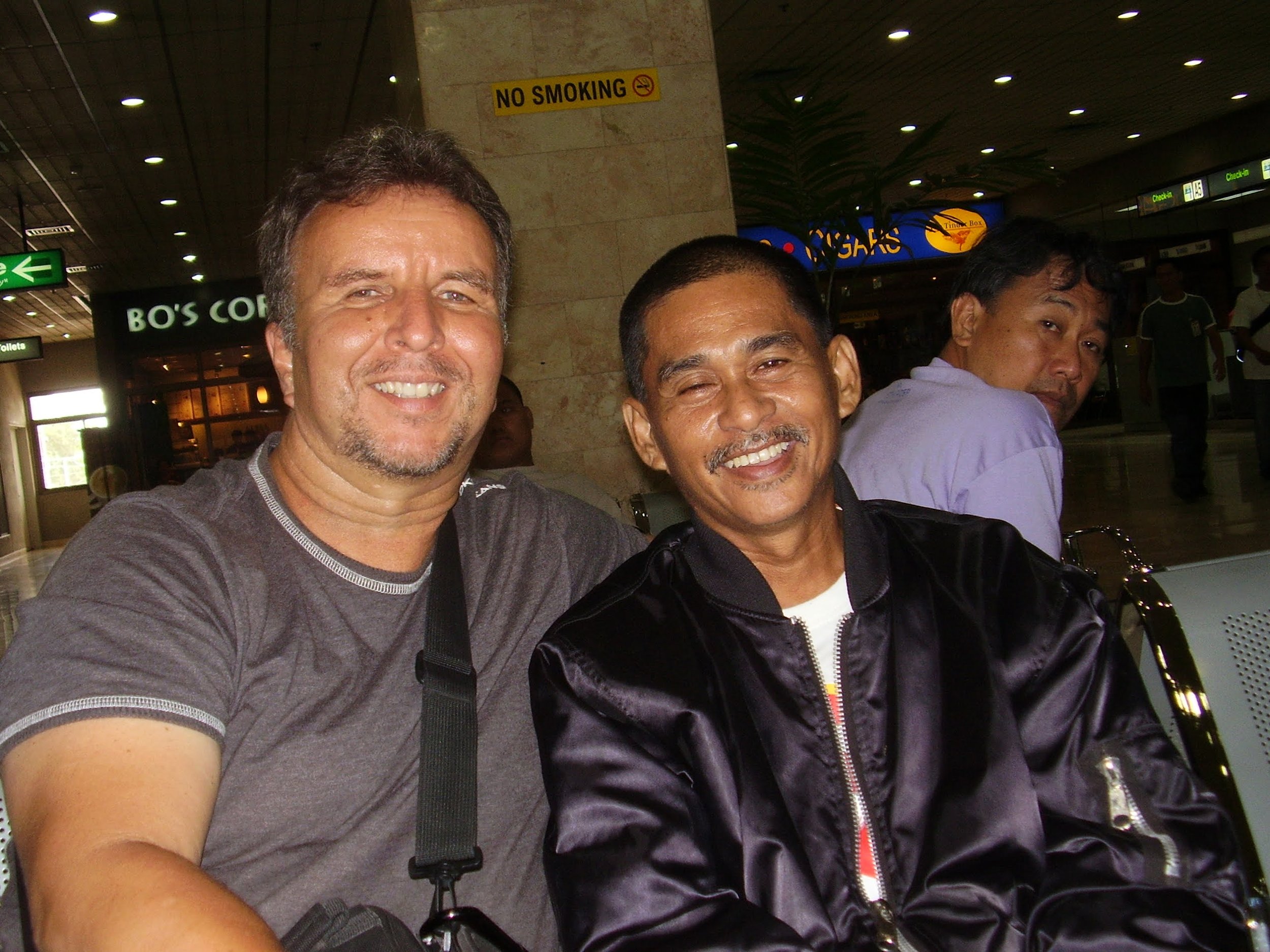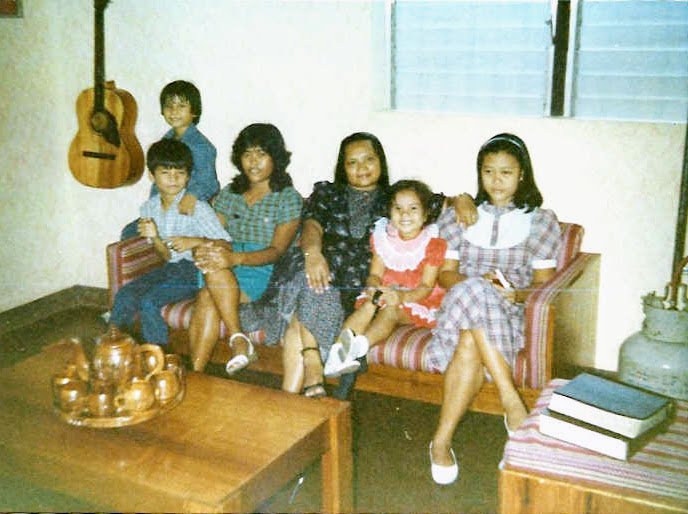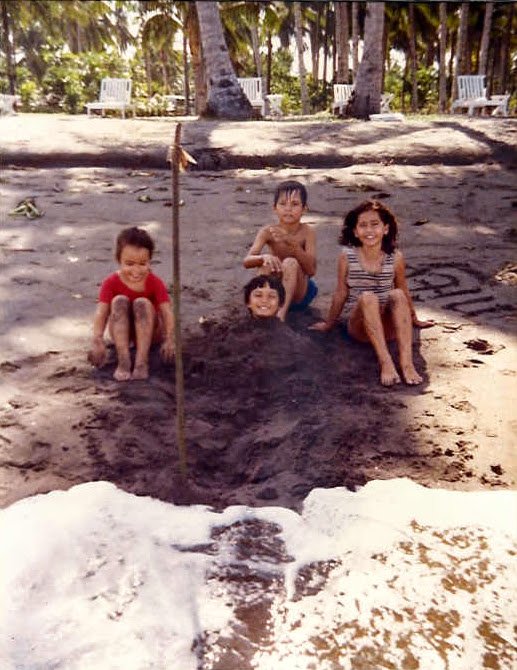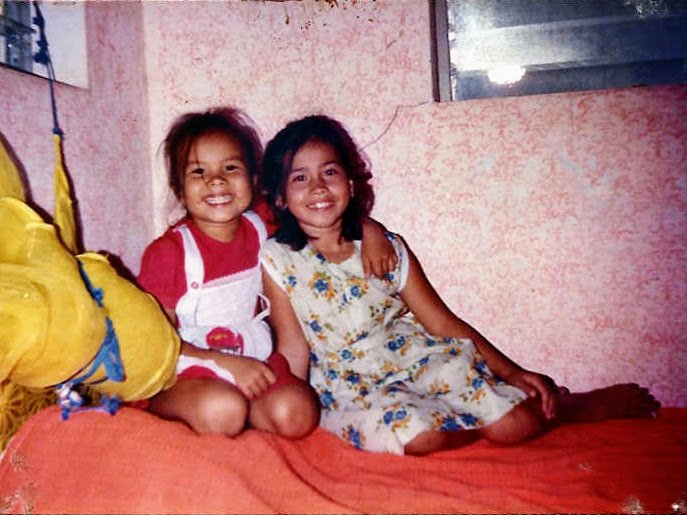The banner photo is of the new 8.9 kilometer bridge that connects Cebu to Mactan Island. Our driving time from southern Cebu to the home of Abbey’s sister on Mactan Island was reduced by over two hours.
Table of Contents
This collection of writings is comprised of stories from the Philippines!
Walking with Jesus into the Darkness
The following is a story about God’s grace following (Mike Garner) a young man into the darkness of the U.S. military’s sanctioned abuse of the women of the Philippines. The story takes place mainly in the year 1976. As a young religiously devout kid from California, a product of Pentecostalism and the Jesus movement in Costa Mesa he faces a dark reality with faith. The primary purpose of this piece is to express the divine aid of God in a life trying to do right. There is more to Mike’s choices than merely ‘white Knight syndrome’. This is affirmed in his life’s stories. Over the course of a long life (that is not yet over) he has continued to move faithfully through the decisions that were made by him as a young man.
From Fuji to Okinawa to the Philippines
I was in a helicopter squadron in the USMC. We transported our Cobra Helicopters in C-130’s and flew from Okinawa to a base below Mt. Fuji Japan for cold weather training. Upon completion we returned to Okinawa to load our Cobra helicopters aboard the USS Tripoli, a light carrier amphibious assault ship, to head for the Philippines.
A Child of Empire / Crossing A Bridge
Upon arriving in the Philippines, we were sent to an orientation class. We soon learned that our little piece of the USA on the largest overseas military base in the world (262 sq. miles) sat in stark contrast to the city across the river whose stench garnered the name ‘shit river’. On the base were American style housing tracts, movie theatres, go cart tracks, churches, golf courses and access to all the products one would have in the USA. We were separated by a few bridges; the Magsaysay bridge was the busiest.
The orientation class was about the area (Olongapo City) where we were to experience the Philippines; however I would leave the boundaries of Olongapo many times despite the sign at the exit to Cabalan that forbade us. The empire’s forces did not blend well with the poverty outside the gate. One of the orientation teachers was the protestant chaplain. He explained to us how throwing coins into the river for the begging children (boys) who would capture the coin under water and return with it between their teeth as though they had caught it with their mouth, led to an early death for most all the boys. He also told us it was impossible to live a Christian life in Olongapo, so we should avoid impregnating any of the many young girls and women who populated the bars (nearly 40,0000 at the height of the Vietnam era). I lost all respect for the chaplain in that class.
It was the mid-seventies and martial law was in force under the rule of Ferdinand Marcos. One evening on my way into the City, while crossing the bridge just outside the gate of the base, I was overcome with anger. I was angry because of the way Olongapo was celebrated by military personnel instead of being wept over. Although we had been asked during our orientation not to throw money into the brown water of the river for the young boys to dive in after, no one listened.
These boys’ beautiful black hair would turn orange-blond from the pollutants in the river. Most of them would die within a few years from the effects of the water on their health. It was a painful spectacle to watch these boys - their skin burnt from the sun. Yet, they smiled, laughed and dove into the water to perform for the American GIs that threw in the equivalent of pennies. They dove into the murky brown smelly water; in moments they would arise from the darkness of the river smiling with the coin held in their mouth. This particular evening, I was not in a good mood. I knew these Sailors were killing these young boys who dove into this nasty water for a mere pittance. I began to punch my fellow soldiers, slap them in the head, and push them and tell them, "You are killing these boys. Why don't you just give them the money?" I made my way across the bridge yelling and punching and kicking, fortunately no one hit me - they all seemed dumbfounded by my behavior, a few were laid out on the ground (not a Christian response, but I was young, ignorant, and a Marine). After reaching the other side I jumped the railing and gave all the boys paper money that amounted to more than the coins for which they were diving. I asked the boys to go home - they didn't.
In the evenings, the crossing of the bridge was more pleasant. Some girls would dress in flamboyant native dress and sing from small three-person Bangka boats. Two Filipino guys would row the boat as the girl would sing. People on the bridge would throw coins into the canoe. The coins that did not make the canoe were hunted for by the young boys the next day.
The few the proud the drunken Marines and the drunken sailors were a bunch of misguided egotistical hell's angels with uniforms instead of motorcycles and leather jackets. America's military representation was no longer that of liberators from Japanese imperialism, but of an oppressor exhibiting arrogance more than compassion. However, in time I would learn that America’s first interaction with the Philippines was as a conquering empire (Philippine/American War 1898-1903).
Olongapo City impacted me as a place depicted in a last day's Christian tract with images of sin and debauchery; tracts were small 2 by 4 comic book like stories that served as a popular evangelistic tool in the early seventies. One evening I was walking the street and half a dozen young girls grabbed me and pulled me into an open store front with stairs leading up to a massage parlor. They were groping me and laughing and telling me I was so handsome and how they wanted to give me a massage. They were quite forceful and I had to become quite aggressive in order to break free from their group hold on me. I can imagine a few innocent guys getting pulled into the debauchery by girls forcefulness.
Read my blog on U.S. Complicity for the Sex Industry in the Philippines and a brief introduction to U.S. history and the Philippines.
Unlike my fellow Marines, I was struggling with how to respond to this horrid mess of bars and abject poverty. There was a Christian Serviceman Center just across the bridge. I went there only to be discouraged by the few guys who hung out there and had no heart to help the victimized women and the struggling poor. I began walking the bar lined streets of Olongapo; there were two parallel streets outside the base. One was for American Servicemen of African Heritage and the other for us lighter skinned guys. At 11:30 all the bars shutdown and no one was to be on the street by midnight when martial law required everyone to be inside. Imagine nearly 40,000 women and at times tens of thousands of military servicemen all on the street. Some of the servicemen were trying to return to base, others were going to the women’s small rooms that generally shared a kitchen, shower area and toilet with others. When curfew was lifted (early in the morning) servicemen could be seen running to get to the base, to work, or to their ship on time. Often these GI’s were shoeless and shirtless, they had left their clothes behind as payment for their night of sex.
I began meeting children and adults fathered by unknown U.S. servicemen from my first time there in the military and throughout the years during my stays and at present 20 times to enter the Philippines. The first mestizo I met was 19 years old, a street hustler. Aside from his thick Tagalog accent he looked more like his unknown father than his mother. He had brown curly hair, a thick beard, and a hairy chest. I had never met a more wild child in all of my life. He knew the ‘ins and outs’ of living in Olongapo and I was amazed at his ability for capitalizing off the presence of prostitution, gambling, U.S. servicemen, and buying and selling pawned items. He had grown up on the streets and it was all he knew. Estimates for the number of children born from the presence of U.S. servicemen in Subic (Olongapo) and Angeles City outside the Clark airbase number at 30,000 per year.
Meeting Joseph Laxamana
A Puka shell necklace street salesman named Joseph approached me and asked why I did not enter the bars like the rest of the U.S. soldiers. My friend Abe was with me, and we explained we were Christians. Joseph invited us out to his small Bahay kubo (a bamboo hut) in Pampanga amidst the sugar cane fields. He took us to the sugar cane factory where he worked and helped us obtain a stack of Tagalog Bibles. I had a plan to enter the bars and witness to the girls about my faith and give them a Bible.
Abe pulled a few of us together and collected enough money to help Joseph build a larger house. His Bahay kubo or nipa hut, was only ten feet square and he had five children! After Joseph expanded his home, we helped him with some cash for furniture.
I spent the night at Joseph’s home several times before he enlarged it with the gifts we provided. He feared the local NPA would harm me so he did not want me to go out and night and relieve my bladder, instead I urinated in a pot. I thought to myself, ‘Now I know what the saying, not a pot to piss in means’. One morning after a breakfast of Duck eggs, dried fish and rice, Joseph and I were outside chatting when two U.S. fighter jets flew incredibly low over our heads. I wondered how I would feel if foreign fighter jets flew over my home. I wondered if we were in fact the good guys.
One evening Joseph asked me to attend a basketball game because he was on one of the teams. The basketball court was dirt and the hoops lacked any kind of netting. Basketball is the Philippines favorite sport, there are backboards, hoops, and makeshift courts everywhere. The crowd was packed around the court so tightly that I felt the need to find a better vantage point from which to view the game. So, I climbed up on the corrugated metal roof of a small shelter. Shortly thereafter so many kids climbed up to be near me that the building began to sway back and forth, I had to jump down before the entire building collapsed.
Joseph wanted to take me out to eat at a local karinderya. He asked me if I wanted some Aso and Rice. I replied, “Sure, sounds good, i’m hungry”. As we were eating I asked Joseph, “What is Aso?” He responded, “Dog”. I had already learned to enjoy eating dried fish and the dog tasted better than my first taste of dried fish so I kept on eating. Along the rice and sugar cane fields of Pampanga eating dog in a karinderya was not uncommon in 1976. On another occasion I just asked for some meat and rice. As I was eating meat off of some small ribs I realized I was eating a really little dog.
Later, because my squadron had returned to Okinawa my only friend was Joseph who stood in as my best man at the wedding ceremony.
Late Nights Rushing to the Gate
Nympha and I were attending the church on Hansen St. each evening and enjoying the Pizza place where folk singers and food was all that was, if you will, ‘on the menu’. When the Pizza place closed at 11:30 I would walk Nympha back to her room in the boarding house near the church. This often put me in a rush to get back to the gate and on the base before midnight. There was always something happening on the streets of Olongapo. I was making my way back and had only five more minutes to get to the gate. There was a lot of noise coming from a dark alley and I stopped to stand in the inset area of a bar entrance thinking that it was best if I not be seen until the noise was over. Then I heard the distinct sound of clomping cowboy boots and the laughter of a drunken American. There he was, one of my helicopter plane captain friends! He was always a wild one. He was laughing and opened his wallet to expose a large bundle of cash. He told me some Filipino guys tried to mug him but he beat them all up and took their money. I wondered if perhaps he just mugged someone and took their money. My economic situation was pressing so I just went ahead and grabbed a big wad of cash from the leather wallet and walked rapidly to the gate with Phil.
Another night I hit the peak moment when the crowd of women and soldiers were on the streets to get home or in the gate before midnight. The U.S. military personnel were headed towards the gate, most of the women were headed the opposite direction to their boarding houses. We were just a mass of conflicting flesh all moving, rubbing, bumping, and girls still grabbing soldiers to take them home. I looked up for a moment and saw the oldest bar girl on the street, her makeup caked on to hide the years. She locked eyes on me and I kept trying to avoid her as the crowd swayed and I was unable to determine my own path. Then there she was the oldest bar girl in Olongapo right in front of me. She grabbed my head and planted it in between her chest and said, “Handsome boy you want to come home with me”. I struggled to get loose from her!
The Navy Shore Patrol was often out on the streets to keep U.S. military personnel out of trouble. I was running late to get to the gate and the crowd was mostly dispersed. I saw a young guy spinning around on a street sign pole and laughing. Two shore patrol personnel were swinging their billy clubs at him and another was on the ground. Then I recognized him, another one of our squadron’s personnel. It was Gary, he had been a golden gloves boxing champion in Jersey and Phil was his best friend. Phil showed up from somewhere and encouraged Gary to stop fighting and run. I just ran along behind them and we all made it back to the gate.
The next morning we were to have a PFT (Physical Fitness Test). I had been running several miles each day to the gate, impatient to wait for the bus. I was 5’8” and 129 lbs. of lean muscle and could run all day. Phil and Gary were in good shape but both of them were still drunk when we woke up at 4:00 am to meet for out PFT. Running on the road along the thick triple canopy rain forest in the humidity of the Philippines can drain one’s energy quickly. The officers were out running with us on this occasion. Phil and Gary were determined to beat the officers on the run in spit of their condition. I ran ahead of them and they did beat the officers but were laughing while throwing up at the finish line. Sadly, after we all came in a lone ‘newbie’ officer in his pride decided not to take the thirty days to assimilate to the weather and participated in the run. He was obviously in trouble, he was moving slower than a normal walking pace and thought he was running. A couple of the other younger officers ran to him and walked him in. He was a new pilot added to our squadron but we never saw him again.









































































